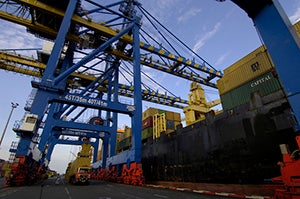 As I get ready to head back to Washington DC after a visit to The Netherlands, I don’t want to miss the opportunity to share with you some thoughts on sustainable logistics.
As I get ready to head back to Washington DC after a visit to The Netherlands, I don’t want to miss the opportunity to share with you some thoughts on sustainable logistics.
While some of you might be familiar with the term, transport logistics refers to the services, knowledge and infrastructure that allow for the free movement of goods and people.
In today’s globalized economies, logistics is recognized as a key driver of competitiveness and economic development. And as policy making turns its attention to promoting sustainable growth paths, valuing scarce resources, and minimizing environmental impacts, sustainable logistics is indeed a key nexus point.
Efficient logistics systems are a precondition for regions, countries, cities and businesses to participate in the global economy, boost growth, and improve the living conditions of millions of people.
That’s why this topic is so important for the World Bank’s mission and our client countries in the transport sector. And that’s why this week in The Hague we organized, together with the government of The Netherlands and partners like Dinalog, the Dutch Institute for Advanced Logistics, our first Conference on Sustainable Logistics.
The story started three years ago when Willem Heeren and Wim Bens, who both worked for Dinalog at the time, contacted the World Bank to explore closer cooperation on sustainable logistics. After a series of interactions and consultations, and now with the support of the Dutch government, we recently launched a Multi-donor Trust Fund for Sustainable Logistics.
The Trust Fund has three main objectives:
- First, to enable developing countries to address climate-related and local environmental impacts caused by the transport of goods, and enhance the competitiveness of their exports through less carbon-intensive value chains—this is the Green Logistics stream.
- Second, to help developing countries address urban congestion from the retail distribution of goods, and improve the sustainable design and operations of port-cities—this is the Urban Freight and Port Cities stream.
- And third, to assist developing countries to strengthen food security and improve the competitiveness of agricultural exports through sustainable reduction in logistics costs as well as food losses—this is the Agrologistics stream.
Power of partnerships
But we cannot do it alone. We need help and engagement from other partners. And here is when the role and support of innovative partnerships, like the one on sustainable logistics, is most welcome and appreciated.
This is not the first time that The Netherlands and the World Bank are working together. Over the years we have shared similar interests: from road safety and water management to women's rights and climate change.
The Netherlands, for instance, has a lot of experience on water-related challenges, as well as on sustainable logistics. Transport and logistics are at the heart of the Dutch economy. Logistics contributes about 50 billion dollars to The Netherlands’ GDP.
The Dutch logistics sector is also considered one of the most efficient and innovative, so the idea is to tap on all this knowledge and best practice to help our client countries become more resilient and competitive.
In the same vein, developing countries are more conscious that seaports and airports are much more than places to load and unload goods: they can become global transport hubs connecting them with other booming regions or cities across the world.
These are just a few reasons why countries need to invest much more in sustainable logistics in the next years. After all, countries depend on other countries’ development to achieve shared prosperity and inclusive growth.
It is therefore crucial to make sustainable logistics practices accessible to the developing world. And we will achieve this by bringing together private sector technologies and know how, effective governmental policies and regulations, convening power, and innovation.
The conference in The Hague and the new World Bank Multi-donor Trust Fund on Sustainable Logistics are proof that, with the right mix of ideas, creativity, funding and initiative from multiple partners, we can achieve much for the benefit of our client countries.
Keep moving!
Read more:
- Multi-Donor Trust Fund for Sustainable Logistics
- Speech by the Dutch Minister of Infrastructure and the Environment, Melanie Schultz van Haegen, at the Conference on Sustainable Logistics
- World Bank Transport website
- World Bank Trade website
- Dutch Institute for Advanced Logistics (Dinalog)
- New World Bank Report -- Efficient Logistics: A Key to Vietnam’s Competitiveness
Photo credit: Jonathan Ernst / The World Bank


Join the Conversation